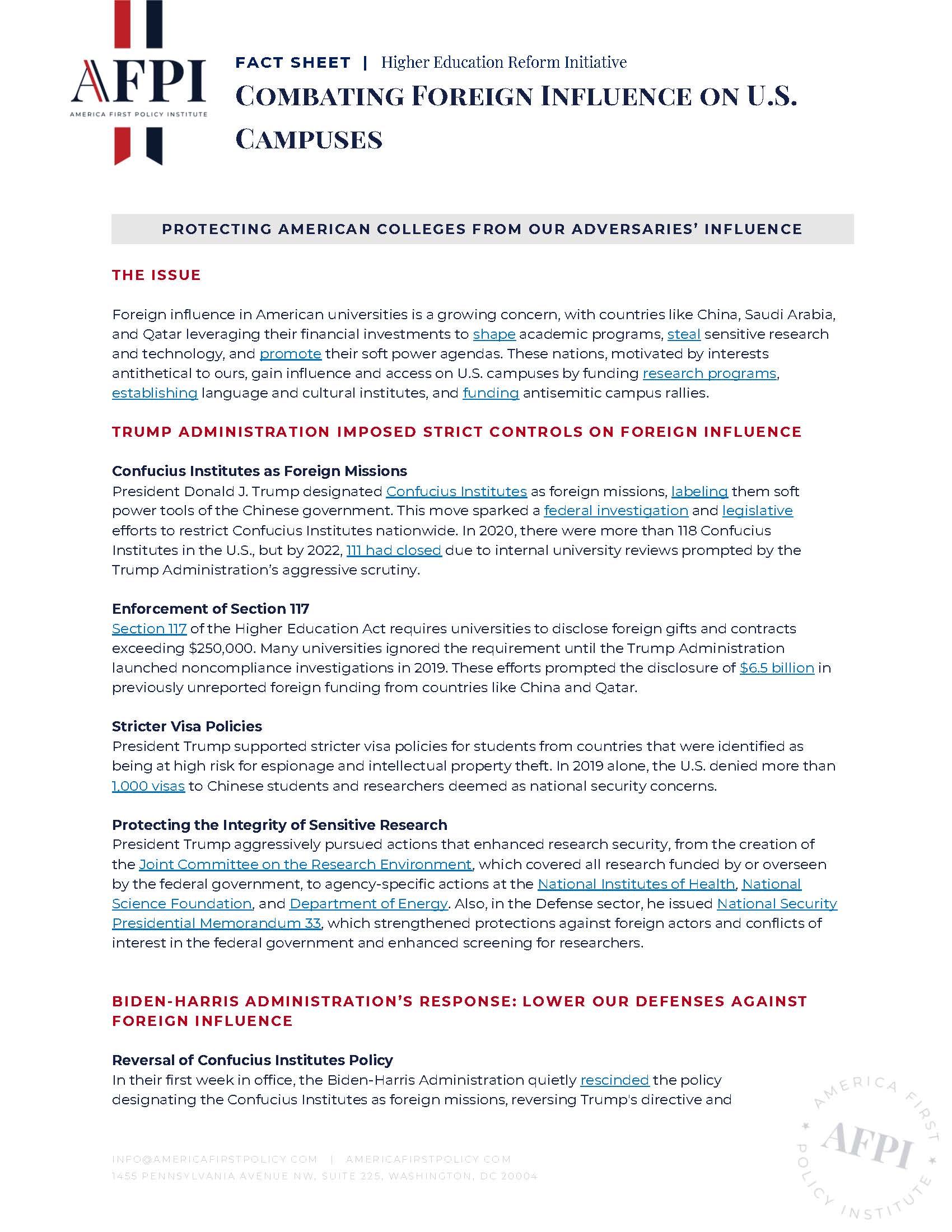Combating Foreign Influence on U.S. Campuses
PROTECTING AMERICAN COLLEGES FROM OUR ADVERSARIES’ INFLUENCE
THE ISSUE
Foreign influence in American universities is a growing concern, with countries like China, Saudi Arabia, and Qatar leveraging their financial investments to shape academic programs, steal sensitive research and technology, and promote their soft power agendas. These nations, motivated by interests antithetical to ours, gain influence and access on U.S. campuses by funding research programs, establishing language and cultural institutes, and funding antisemitic campus rallies.
TRUMP ADMINISTRATION IMPOSED STRICT CONTROLS ON FOREIGN INFLUENCE
Confucius Institutes as Foreign Missions
President Donald J. Trump designated Confucius Institutes as foreign missions, labeling them soft power tools of the Chinese government. This move sparked a federal investigation and legislative efforts to restrict Confucius Institutes nationwide. In 2020, there were more than 118 Confucius Institutes in the U.S., but by 2022, 111 had closed due to internal university reviews prompted by the Trump Administration’s aggressive scrutiny.
Enforcement of Section 117
Section 117 of the Higher Education Act requires universities to disclose foreign gifts and contracts exceeding $250,000. Many universities ignored the requirement until the Trump Administration launched noncompliance investigations in 2019. These efforts prompted the disclosure of $6.5 billion in previously unreported foreign funding from countries like China and Qatar.
Stricter Visa Policies
President Trump supported stricter visa policies for students from countries that were identified as being at high risk for espionage and intellectual property theft. In 2019 alone, the U.S. denied more than 1,000 visas to Chinese students and researchers deemed as national security concerns.
Protecting the Integrity of Sensitive Research
President Trump aggressively pursued actions that enhanced research security, from the creation of the Joint Committee on the Research Environment, which covered all research funded by or overseen by the federal government, to agency-specific actions at the National Institutes of Health, National Science Foundation, and Department of Energy. Also, in the Defense sector, he issued National Security Presidential Memorandum 33, which strengthened protections against foreign actors and conflicts of interest in the federal government and enhanced screening for researchers.
BIDEN-HARRIS ADMINISTRATION’S RESPONSE: LOWER OUR DEFENSES AGAINST FOREIGN INFLUENCE
Reversal of Confucius Institutes Policy
In their first week in office, the Biden-Harris Administration quietly rescinded
the policy designating the Confucius Institutes as foreign missions, reversing Trump's directive and reducing oversight on these institutions. Thankfully, universities that decided to close their institutes already had their closures in motion by the time this change was made.
Lax Enforcement of Section 117
The Biden-Harris Administration deliberately loosened enforcement of Section 117 by moving responsibility for monitoring compliance from the Office of the General Counsel to Federal Student Aid, which lacks the specialized expertise to monitor and enforce complex compliance issues surrounding foreign gifts. It also closed outstanding investigations and shuttered the public-facing database—actions that raise serious concerns about compliance and public accountability.
Biden Touts Pro-Hamas Agitators’ “Free Speech;” Omits Mention of Their Foreign Funding
In his remarks on the antisemitic encampments and violent protests that roiled U.S. campuses after October 7, President Biden’s remarks focused entirely on the distinction between the First Amendment right to protest and acts of violence toward Jewish students and destruction of property. The Biden-Harris Administration has failed to address the foreign funding behind the groups sponsoring these events, including Iran—the largest state sponsor of terrorism—which is using the campus protests to foment division. Also, the Department of State has done nothing to revoke visas, and the Department of Homeland Security has done nothing to deport the foreign students at the center of the protests—many of whom have obviously triggered grounds of inadmissibility by espousing support for designated terrorist organizations.
THE TAKEAWAY
The Trump Administration took decisive steps to mitigate foreign influence on U.S. campuses by implementing policies that enhanced transparency and accountability of foreign funding. By designating Confucius Institutes as foreign missions and enforcing Section 117, the Trump Administration successfully prompted the disclosure of billions in foreign funding and reduced potential espionage risks. In contrast, the Biden-Harris Administration rolled back these measures, reducing oversight and failing to address the foreign funding behind campus protests. These actions have led to increased concerns about the unchecked influence of foreign entities in American higher education, potentially compromising academic freedom and national security.
